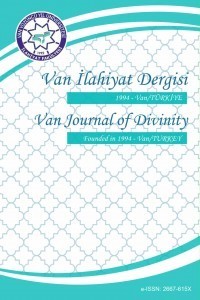Abstract
Peripatetik felsefî yaklaşımın en önemli filozoflarından birisi olarak kabul edilen İbn Rüşd (1126-1198), dönemin felsefe paradigması içinde hemen her alana dair eserler kaleme almış bir düşünürdür. Onun kaleme aldığı eserlerin çok büyük bir kısmı, Aristoteles’in eserlerine dair şerhler oluşturmaktadır. Bu sebeple o Büyük Şarih (Big Commentator) olarak anılmıştır. Bu şerhler büyük, orta ve küçük şeklinde üç tarzda yazılmıştır. Burada Türkçeye çevirdiğimiz eser, Aristoteles’in Organon diye bilinen mantık külliyatının ikinci kitabı olarak kabul edilen Peri Hermeneias adlı eserin orta şerhidir. Bu eserin genel muhteviyatı isim, fiil ve edat gibi genel lafızlarla başlar, önermenin yapısı, niteliği, niceliğiyle devam ederek ve önermelerin modalitesiyle son bulmaktadır. Ele alınan konuların kapsamı Peri Hermeneias ile aynı derece ve sıralamaya sahiptir. Yer yer İbn Rüşd, yaklaşımına dair yeni şeyler eklese de eser, daha çok bir serbest çeviriyi andırmaktadır.
Keywords
Abstract
Considered as one of the most important philosophers of the peripatetic philosophical approach, Averroes (1126-1198) is a thinker who has written works in almost every field within the philosophical paradigm of the period. The vast majority of his works are interpretations of Aristotle's works. For this reason, he was called the Big Commentator. In particular, his way of reinterpreting Aristotle caused large followers in Europe and Aristotle texts were tried to be understood through him. These commentaries are written in three styles, large, medium and small. Here, the work we translated into Turkish is the middle commentary of the work named Peri Hermeneias, which is accepted as the second book of the logic collection of Aristotle known as Organon. The general content of this work begins with general phrases such as noun, verb and preposition, continues with the structure, quality and quantity of the proposition and ends with the modality of the propositions. The scope of the topics covered has the same degree and ranking as Peri Hermeneias. Even though Averroes added new things about his approach, the work resembles a free translation. This work is about the expressions that constitute the article of the syllogismus which are the reasoning form of epistemic validity, which is expressed as burhani. These expressions form a kind of sentence called proposition. Propositions are sentences that have the ability to make definitive judicial statements. This is why logic science deals with propositions rather than other types of sentences. Because judicial reporting provides the possibility of scientifically negotiable and talkable.
Keywords
Details
| Primary Language | Turkish |
|---|---|
| Subjects | Religious Studies |
| Journal Section | Translations |
| Translators | |
| Publication Date | June 15, 2020 |
| Submission Date | April 17, 2020 |
| Acceptance Date | May 15, 2020 |
| Published in Issue | Year 2020 Volume: 8 Issue: 12 |



